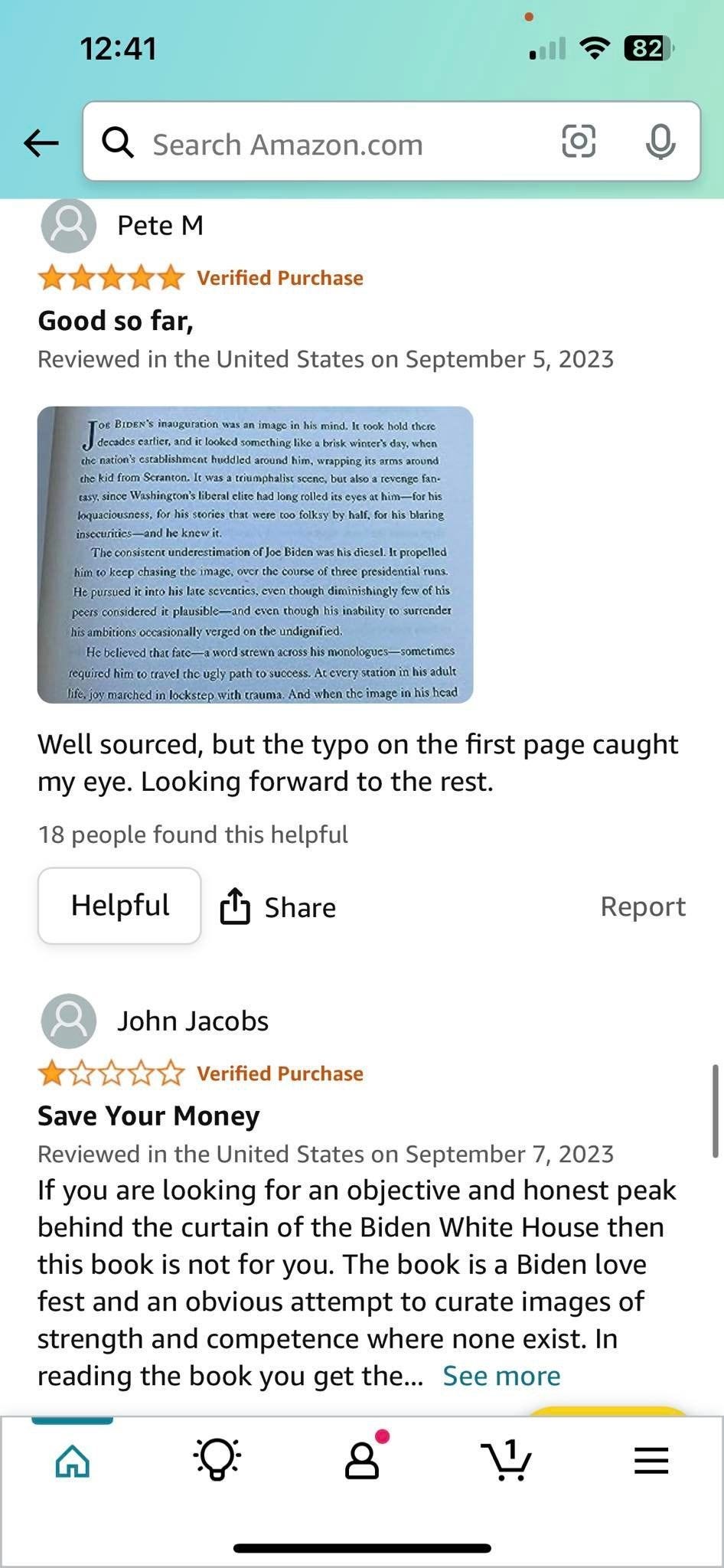A Critique on Critiques: The Absurdity of Amazon’s Book Reviews
Stars are often weapons for the cynical, hateful, and dumb.

Amazon, the e-commerce monolith, has been the death and life of publishing, the grim reaper, and the nurturing cradle in one fell swoop. A prime venue (pun intended) for independent authors to sidestep traditional gatekeepers, Amazon has opened doors previously barricaded by the old guards of publishing. Yet, it’s also home to a perplexing phenomenon — a proverbial battleground of intellectual discourse, littered with the casualties of illogical, and at times, absurd book reviews.
I recently moderated a six-author panel at the St. Louis Public Library and most of the authors agreed: they rarely read their reviews. I peek at mine here and there, but less and less as I write more books. Why? Well, because there’s nothing you can do about a reader’s opinion. Especially when the opinion is irrational.
Stephen King sums up a thought many a writer has had in the face of bad or just plain unfair reviews:
“I have spent a good many years since―too many, I think―being ashamed about what I write. I think I was forty before I realized that almost every writer of fiction or poetry who has ever published a line has been accused by someone of wasting his or her God-given talent. If you write (or paint or dance or sculpt or sing, I suppose), someone will try to make you feel lousy about it, that’s all.”
But we’re adults, and we can handle bad reviews. It’s the dumb ones that sting.
Picture this scenario: An author pens a fascinating exploration of string theory, challenging the boundaries of known physics. They publish their work on Amazon and await the first reviews, the harbingers of future sales. The first feedback rolls in: one star. The reason? The customer’s dog chewed up the book. The literary value of the book is now undermined by a teething Labrador. A stark example of capitalism’s grand narrative going astray, my friends.
Or how about this? A gripping novel set amidst the socio-political turmoil of the Vietnam War receives a two-star review. The indictment? Lack of recipes. Yes, ladies and gentlemen, no instructions on how to make a Bánh mì in a war zone. Is this an expected attribute of a historical fiction novel now?
Then we have the logistics complaint brigade. Those who wage their personal wars with FedEx or UPS in the realm of book reviews. Because, clearly, a delayed delivery is the author’s failure, a reflection of their narrative prowess. A sort of twisted intellectual causality where the shortcomings of a third-party logistics service somehow resonate within the thematic constructs of a book. It’s as nonsensical as blaming Apple’s iPhone for AT&T’s spotty coverage.

Check out these examples of misguided or irrelevant book reviews on Amazon:
The Lost-in-Translation Review: For a book about the cultural intricacies of Japan, the review reads, “Couldn’t understand it. Too much Japanese culture.” It’s as if someone read a book about quantum physics and complained about too much science.
The Formatting Complaint: “Great book, but the eBook had weird spacing on my old Kindle. One star.” This is like blaming an artist for how their painting looks in bad lighting. The quality of the content and the medium through which it is viewed are two different things.
The Spoiler Review: “Gave away the ending on page 123. Ruined the book for me.” Revealing major plot points in reviews is a thoughtless move that spoils the reading experience for others. A book review is not the place for spoilers. Remember, folks, it’s a review, not a book club discussion.
The Outside-the-Genre Review: A review for a book on global economic policy states, “Too much economics and not enough action. I prefer books with more suspense.” This is akin to complaining that your economics textbook doesn’t read like a Tom Clancy novel. If you buy a book on economics, expect it to contain… economics.
The Overly Personal Review: “Didn’t like the main character’s name. Reminded me of my ex-husband. One star.” In the grand scheme of literary critique, personal biases like this shouldn’t factor into a book’s overall rating. This is judging a book by the cover taken to an extreme level.
These are but a few examples of how the intention behind book reviews — to share valuable opinions about the content of a book — can sometimes get lost amidst personal issues, irrelevant complaints, and misunderstandings about a book’s content.
And don’t get me started on Goodreads. While Goodreads can be a fantastic platform for book lovers to share opinions and discover new reads, it is not immune to flaws, often hosting reviews that are prejudiced, superficial, or plagued by the same misguided criticisms, such as irrelevant complaints and genre misunderstandings, that we find in Amazon’s review landscape. It is also a place where people will gang up on a book and crush it.
Profanity Police
Let’s turn our attention to another set of curious culprits in the world of skewed Amazon reviews — the profanity police and the trigger warning watchdogs. These folks deem it their sacred mission to penalize books for “bad language” or lack of trigger warnings.
Let’s get one thing straight: profanity, like any other linguistic device, can serve a purpose in a book. It can reveal character, set tone, or paint a realistic picture of a certain time or place. To degrade a book merely on the basis of its raw vernacular is a shallow interpretation of literature.
Actor Stanley Tucci’s delightful memoir, Taste, is fantastic. I’ve listened to the audiobook three times and found his narration engaging and fun, the stories interesting, and the recipes divine. (Like him, I suffered an injury that nearly cost me my sense of taste. Read the book for his serious health scare, and if you want to hear about my half-a-year without being able to enjoy food, listen in here.)
Most reviewers agree that his book is great, except for several people who are seriously bent out of shape by his sporadic use of the word fuck:
Been there, myself. Have a look at this winner commenting on one of my mystery novels:
I mean, I guess Betty is right — no actual murderer, detective, bartender, beach bum, or pirate would ever use such language. I had another reviewer who gave me a one-star and admitted he didn’t read the book.
Grow. Up.
Triggered
On the other hand, while it’s reasonable to expect trigger warnings in certain contexts, it’s not a universal rule that all books must conform to.
Literature, even low literature like my stuff, often mirrors life, and life, in all its gritty, painful, and sometimes shocking reality, doesn’t come with trigger warnings. Giving a low rating to a book because it didn’t cushion your sensibilities is akin to critiquing a mirror because you don’t like your reflection. It undermines the essence of storytelling and disregards the author’s creative prerogative.
I don’t consider it my responsibility to warn readers that my series character John Pilate eats meat. He has sex, sometimes in circumstances your Sunday school teacher would not approve of. He drinks booze. He’s divorced. He has some emotional issues. He even swears on occasion. I’m not listing all that at the beginning of every book in the series. If a reader can’t handle violence, assault, murder, profanity, or the interior monologues of flawed people, then maybe they shouldn’t buy books labeled as adult mystery thrillers. The excellent and gentle cozy mystery genre is probably what they’re looking for — and that’s great. Just don’t try to make my grittier stories conform to that standard.
Shut Up and Sing
Some critics seem to operate under the fallacious assumption that authors should, or even can, entirely extricate their politics from their writing. I call this the “Shut Up and Sing” mindset.
Let’s clear this up right now: writing is not created in a vacuum. Authors, like all humans, are influenced by their beliefs, their environment, and their societal and political viewpoints. These elements naturally seep into their work and are often what give their narratives depth, authenticity, and relevance.
To demand that a writer leave their politics at the door is akin to asking them to strip their work of context, perspective, and, often, vital parts of their own identity. It also demonstrates a profound misunderstanding of the purpose of literature, which is not merely to entertain, but also to challenge, provoke thought, and reflect the realities — political or otherwise — of our world.
If your political and moral beliefs are so fragile that you cannot abide reading anything that contradicts them, if you insist on a politics-free narrative, perhaps stick to nursery rhymes. Mature literature, like the real world, is infused with the politics of its time. Recognize this, accept it, and engage with it, rather than penalizing authors for the inevitable presence of their politics in their work.
Name Dropping
And more than a few took umbrage at Tucci’s “name dropping.” Imagine that, an actor for 40 years, Stan actually has the temerity to mention the names of actors and other famous people. Perhaps he should have dropped the name of his insurance agent or the greeter at Sainsbury’s instead.
I also saw this in some of the reviews of my two-time Mysterious Goings On Podcast guest George Stevens, Jr., the legendary founder of the American Film Institute who worked for JFK and was personal friends with more political and Hollywood bigwigs than you can shake a stick at. Yet some jabronis criticized his excellent memoir, My Place in the Sun, for mentioning he knew people like Edward R. Murrow, Katherine Hepburn, and Sydney Poitier.
They missed the memo on memoirs, I guess. A memoir is a personal narrative that chronicles the author’s experiences, interactions, and the people they’ve crossed paths with over the course of their life. If those people happen to be well-known or influential figures, mentioning them isn’t name-dropping; it’s simply recounting the facts. Criticizing an author for this is as absurd as berating a historian for referencing historical figures. These critics, with their misguided accusations of name-dropping, are effectively penalizing a memoirist for having an interesting life.
Rather than finding fault with the lives these accomplished individuals have led, critics should appreciate the unique, behind-the-scenes perspectives offered in these memoirs. Let’s hope that in the future, reviewers can grow to appreciate this genre for what it truly is — a personal narrative filled with rich, diverse experiences and, yes, a few famous names.
Petulant People
What’s most disheartening is the childish demeanor prevalent in many Amazon book reviews. These critiques, marked by a simplistic, almost petulant tone, reduce the nuanced art of literary critique to a playground squabble. Book reviewing isn’t a space for tantrums or personal grudges. It’s not a place to whine because a book didn’t cater to every idiosyncratic whim or because a plot twist upset your Sunday afternoon. Nor is it a platform to nitpick on minutiae while blatantly ignoring the book’s broader narrative arc, themes, or stylistic merits.
Such reviews, driven by impulse rather than thoughtful analysis, rob literary criticism of its intellectual richness and credibility. They trivialize an author’s effort and commitment to craft and leave a tarnish on the discourse surrounding literature.
Typo Tyrants
And then we have the occasional typo tyrants, the eager beavers who leap at the chance to tank a book’s rating at the first sight of a misplaced apostrophe or a wayward semicolon. Let’s put things in perspective here. Typos, while not ideal, are the occasional blemishes in the otherwise meticulous process of writing, editing, and publishing. They are the human error in an innately human endeavor — telling stories. To downgrade a book for a typo or two is to lose sight of the forest for the trees. It’s to prioritize the trivial over the substantial — the content, the ideas, the storytelling.
Then we have someone else who has to rush and tell us they haven’t finished the book but they found a typo and here’s a photo.
While attention to detail is indeed important, an occasional typo should not overshadow a book’s overall literary value. As readers, we must strive to cultivate a more balanced and fairer mindset when reviewing books. That means acknowledging the occasional typo as just that — occasional — and not letting it detract from the broader picture of a book’s merit.
Unhappy Endings
Now, onto a particularly vexing breed of reviewers: those who unfairly downgrade a book simply because it doesn’t end the way they think it should. These self-appointed narrators seem to forget that they’re reading someone else’s story, not writing their own. A plot’s direction, its twists, and turns, and ultimately its conclusion, are the creative choices of the author. They reflect the writer’s intent, their vision of the narrative arc, and their interpretation of the characters’ journeys.
To penalize a book because it didn’t wrap up neatly with a bow according to your personal tastes is a gross misinterpretation of the role of a critic. It’s akin to berating a painter because you don’t like the color palette they chose. We need to remember that reading someone else’s book is a privilege, an invitation into their creative universe. As reviewers, it’s our job to respect that, even if the ending isn’t exactly as we imagined it would be.
My advice to these folks: write your own damn book.
In Review
The next time you write a book review, first of all, thank you. It is so difficult to get a review written — even one that takes two minutes to post online. That said, please remember to evaluate the product, not extraneous circumstances. Otherwise, you’re merely fueling the cycle of absurdity, and we’ve got plenty of those already. We are not just consumers, but contributors to a collective intellectual ecosystem.
Let’s act like it.









